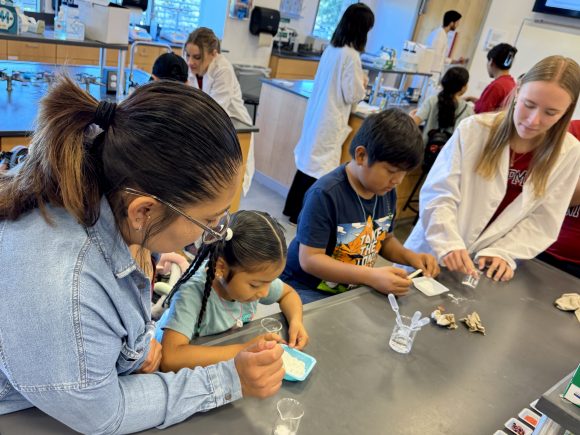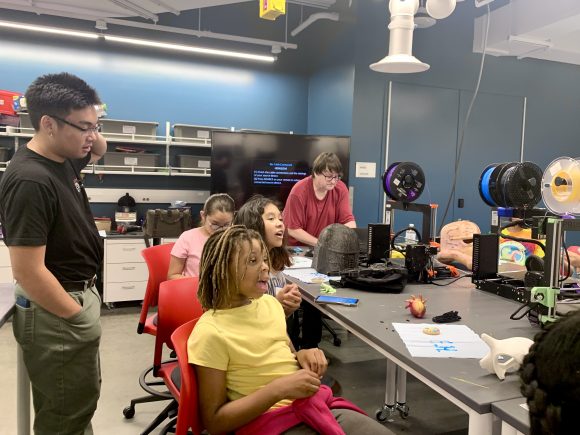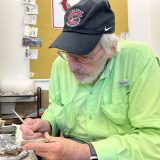Science in the Community: TriBeta Hosts Local Youth For a Science-Packed Saturday
November 9, 2023
“It is all too easy for us to overlook our blessings and not appreciate the value of higher education. Our mission is to demonstrate the boundless possibilities within higher education.”
On Saturday, October 21, Chapman’s chapter of Beta Beta Beta (TriBeta) partnered up with course SCI 320/420, “STEM in Action: The Development of STEM Pedagogies in Service Learning,” to host Higher Ground Youth and Family Services at the Keck Center. This is the second semester TriBeta has worked with Higher Ground, a non-profit organization that provides support and resources to Orange County families.
The day was centered around STEM in higher education, and the event gave Higher Ground students and families an opportunity to learn about higher education in scientific fields. About 60 Higher Ground members attended, and 45 Chapman students provided guidance as they rotated through several stations. Ranging from second- to eighth-graders, attendees extracted strawberry and banana DNA with biology professor Melissa Rowland-Goldsmith, fed hermit crabs with biology professor William Wright, created toothpaste with the Chapman Pre-Dental Society, and worked with Jon Humphreys of the Fowler School of Engineering to learn how to 3-D print.

Attendance at Saturday’s event was about double what the group saw at the same event last Spring. “The increase in participants is great, because we hope to make this a Schmid tradition in the future,” said Mo Hijazi ’24, President of TriBeta.
A portion of the event was tailored to the parents in attendance. Assistant Professor of Chemistry Cecilia Lopez gave a talk about her path to becoming a scientist, and Jonathan Charres from Chapman’s Undergraduate Financial Aid office spoke about the relative costs of attending different kinds of institutions. Charres explained how financial aid is awarded and broke down the various financial resources available to low-income families. “He was able to reassure the parents that no matter what their educational background is, they can still support their children through higher education,” said Hijazi.
TriBeta, the Biology Honors Society at Chapman, has about 60 members. “We’re here to provide research opportunities and a platform for students to share their research at conferences,” said Hijazi. “What sets us apart is our commitment to connecting students with research labs, mentoring, and sharing our love for STEM with students from underserved communities.”
For Hijazi, the event provided an opportunity to “connect with the Higher Ground students on a much deeper level than merely focusing on STEM subjects.”
“Many of us used STEM as a tool to not only inspire the students but also to encourage them to express their emotions and experiences,” he said. “As the event progressed, it was evident that our students had formed genuine connections with the Higher Ground students and had successfully ignited their enthusiasm for the prospect of attending college in the future.”

Hijazi heard promising comments throughout the day, with young students saying “I’m really looking forward to attending Chapman when I grow up,” “When can we visit again?” and “Do you get to do all these amazing things every day?”
“TriBeta recognizes the significance of engaging with the broader community beyond Chapman, as we are privileged to have the opportunity to pursue a college education,” said Hijazi. “It is all too easy for us to overlook our blessings and not appreciate the value of higher education. Our mission is to demonstrate the boundless possibilities within higher education, educate the community about the available resources that can aid students in their pursuit of higher education, and actively contribute to the cultivation of a diverse cohort of future scientists.”

